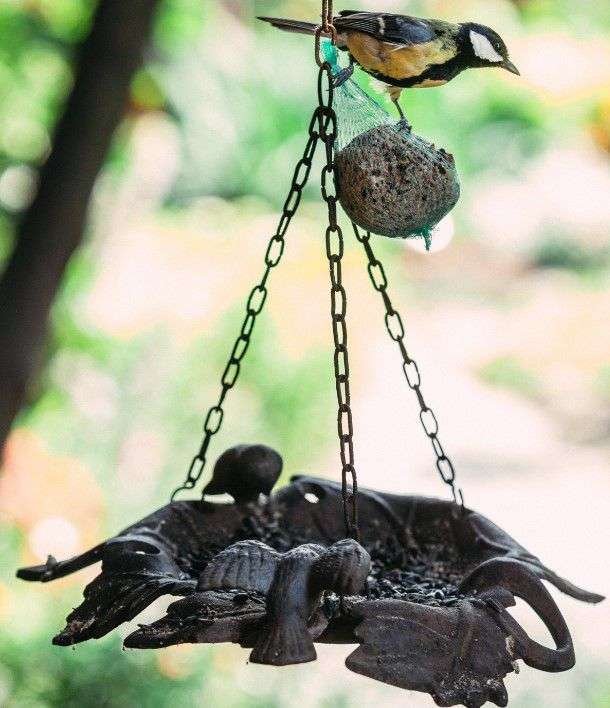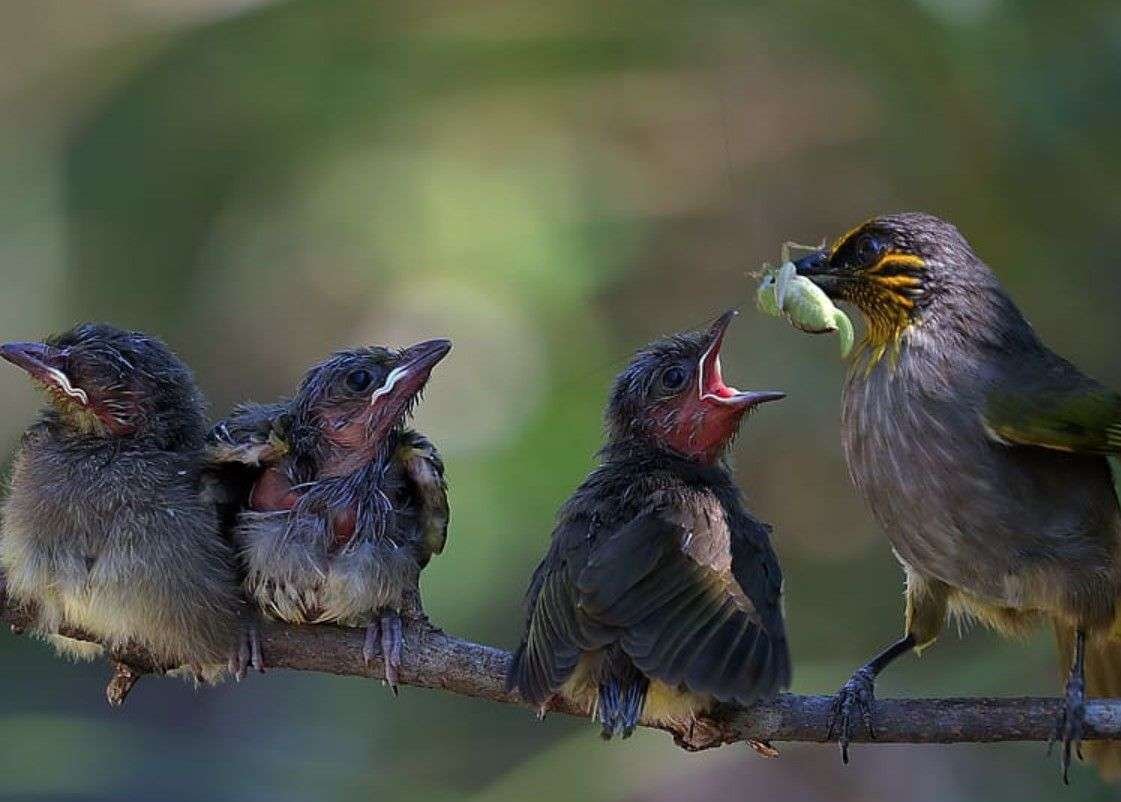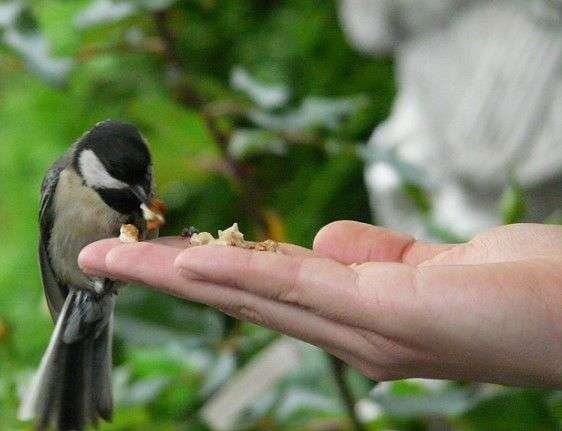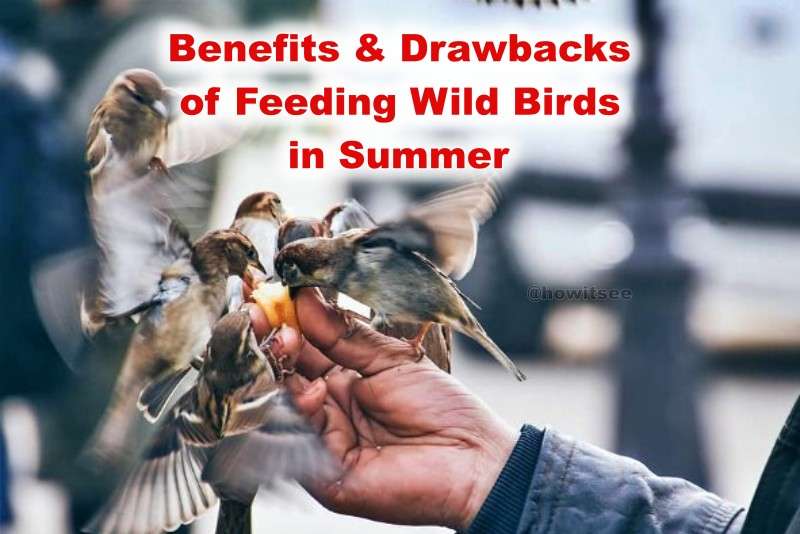Many people enjoy feeding wild birds, particularly in the summer when they are more active and noticeable. People of all ages can take pleasure in feeding wild birds, which has been acknowledged as a method of establishing a connection with nature. Like most things, feeding wild birds in the summer has advantages and disadvantages.
The ability to maintain the survival of wild birds during the breeding season is one of the most significant advantages of feeding them in the summer.
Because breeding birds expend a lot of energy rearing their young, this is particularly significant. The nutritional requirements of the birds can be supported, and their chances of survival are increased by using bird feeders, which offer a food supply.
Bird feeders can become breeding grounds for dangerous infections when many birds flock there. Also, providing food for birds may draw rats and squirrels, which can ruin gardens and cause damage to houses.
The effect of summertime bird feeding on the animals’ normal foraging behavior is another possible disadvantage. Bird feeders can artificially depend on people by supplying a steady source of food, which can reduce the birds’ ability to forage on their own in the wild. The power of the birds to survive and flourish in the wild may suffer as a result over time.
Feeding Wild Birds in Summer
Benefits:

1) Improved bird health and survival
Feeding birds might also encourage them to reproduce in your area. If birds are well-nourished year-round, including during harsh winters, they are considerably less likely to prioritize finding food above having young.
Hence, you may aid in the maintenance and potential growth of bird populations by providing food for them in your garden or elsewhere in nature.
Birds will breed more frequently if you provide food, and their offspring will have a significantly better chance of survival due to their parents’ increased strength and ability to locate suitable food sources.
When temperatures soar in summer, birds will welcome an excellent, refreshing meal at the feeder. The birds’ nutritional needs will be satisfied by adding a nutrient-rich supplement to their regular feed.
Hence, from the point of view of reproduction, bird feeding might make quite a lot of sense to preserve the population of our local bird species.
2) Enhanced bird diversity in your backyard
Feeding your birds in the winter will likely bring in many different species. Hence, if you want to get the most out of the benefits of feeding birds daily, you need to adjust to the likes of the birds about their preferred meals.
This may be fascinating since you will likely become familiar with many kinds of birds and learn much about their preferences.
During the summer, birds commonly do this when actively building nests and raising young. It broadens the scope of your outside space.
3) Enjoyment of bird watching and connecting with nature
Feeding the birds is a great way to get outside and enjoy nature. Many of us have even stopped caring about the natural world.
A lack of understanding of biological processes and the need to protect and conserve the environment is widespread among those who spend most of their waking hours in an urban workplace.
Providing birds with food may help people feel closer to nature and more fulfilled. Our predecessors have survived in natural settings for thousands of years, and it’s unlikely that our bodies and minds were designed to sit in front of a computer all day.
Hence, providing food for birds is good for the environment and for returning to one’s origins.
4) Supporting conservation efforts
Seeing birds at feeders is enjoyable on its own, but there is also the added benefit of preventing disturbances to the local food web, which is good for the environment.
The interconnected nature of all life in our ecosystems makes them very intricate. For instance, if a predator’s favored food supply suddenly becomes harder to come by because its prey population has declined, the predator’s population may fall.
The extinction of some bird species has been predicted due to human activities such as deforestation and global warming.
It follows that if we feed the birds, we may be able to aid in preserving the local ecological balance, which is crucial to the long-term health of the natural environment. By providing them with a food supply, you will contribute to preserving this species.
5) Bird feeders promote bird health
Feeding birds is a great way to get back in touch with nature and contributes to a greener way of living.
If you take the time to feed birds and appreciate the wonders of nature, you’ll be more inclined to adopt environmentally responsible practices since you’ll realize the need to do so for the sake of the earth and the birds.
Bird feeding may be the first step toward a much more eco-friendly lifestyle in general, and raising people’s awareness of environmental issues is essential if we address them.
Backyard bird feeders significantly affect the long-term survival of wild birds since birds in areas with feeders are often healthier than birds in places without feeders.
6) Feeding birds is a calming and stress-reducing hobby
The happy chirping of wild birds in the trees around your backyard is one of the most peaceful sounds you may encounter.
Feeding wild birds is popular since it provides a relaxed and entertaining view of nature in people’s backyards. Feeding birds is a great way to escape the stress of everyday life in today’s high-tech environment.
7) One of your primary interests can be providing food for birds
Feeding birds might quickly become one of your favorite pastimes. Indeed, many people tend to grossly underrate the enjoyment of studying bird behavior and watching birds.
Hence, while some individuals may abandon bird feeding after a very short time, lovers may persevere and acquire a genuine enthusiasm for it.
Feeding birds may be done in a variety of settings outside simply your backyard.
For instance, if you are close to a forest or other natural habitat, you may easily travel to those locations and feed birds in the wild. There is also the option of going out into the wild to provide food for the birds there.
Drawbacks:

While some positive outcomes might come from summertime bird feeding, such as aiding conservation efforts and drawing in numerous species, some potential drawbacks should be taken into account.
When people supply food for wild birds, the birds grow reliant on them, pests are drawn to them, and diseases are spread from person to person.
Birds and other animals may starve to death due to improper feeding practices. Knowing these risks and working to mitigate them is essential to ensure that bird feeding continues to be a harmless hobby.
1) Attracting unwanted pests and predators
Feeding wild birds in the summer might have inevitable consequences that should be addressed. The presence of pests and predators in your garden is one of the possible negatives.
When you set out bird feeders, you may also attract other creatures like squirrels, mice, or rats drawn to the food. These creatures might cause damage to your property, or they may compete with birds for food.
In addition, the food you supply may attract predators such as hawks, owls, or cats, who may feed on the birds. Feeding birds may also attract insects such as ants, wasps, and bees.
These pests may set up housekeeping near your feeding station or inside your home. Moreover, birdseed may also get moldy or spoilt, which can attract additional bugs and pose health concerns for the birds.
2) Increased risk of disease transmission
Feeding wild birds in the summertime raises concerns about the spread of disease. Birds can quickly spread illnesses to one another when they assemble at feeding stations.
Diseases like avian pox and conjunctivitis can soon spread when birds are in close quarters with one another. If the condition is endemic to the area or affects a high percentage of the bird population, it could have a disastrous effect on the local bird population.
Leftover food and droppings can hold hazardous bacteria and viruses, especially if the feeding station isn’t properly maintained and cleaned.
Cleaning the feeding station regularly and keeping it free of excess birds are two ways to maintain a healthy environment for the birds you feed in the wild.
It’s essential to follow these guidelines to help keep feeding wild birds a safe and responsible practice while minimizing the spread of disease.
3) Dependency on human-provided food
Some wild birds may develop a need for human assistance if they are fed throughout the summer. Birds may stop foraging for food elsewhere if they discover a consistent supply in one area.
They may be less able to forage and survive without our help. But if the food supply suddenly vanishes, such as if the person feeding the birds stops doing so, the birds may have trouble locating alternate food sources, which may severely impact their health and wellness.
So, it is essential to supply supplementary food and not depend on feeding as a significant source of nourishment for wild birds. Over time, particularly toward the end of summer, reducing the food offered will educate the birds to forage in the wild for sustenance.
4) Potential harm to the environment
Feeding wild birds may affect the ecosystem if too much food is given out or the food isn’t suitable for the local bird population. Overpopulation and the disruption of ecosystems are possible results.
5) Wild birds might unlearn competitive feeding behaviors
Birds, however, should never forget how to take care of themselves, as they will be in dire straits if you ever stop feeding them. In most cases, if you give wild animals table scraps, they will forget how to forage for food.
As a matter of convenience, those birds will likely prefer to rely on you as their primary food supply rather than venture out into the wild to forage.
6) Having pets can make bird feeding a challenge
If you have pets, feeding the birds can be a significant hassle. The birds in your backyard, especially if you have a cat, are in danger of harm.
To ensure our birds’ highest level of safety, please refrain from feeding them if you have a pet that could potentially hunt them. Simply put, this is how the natural world works; you have no control over it.
Understanding these possible negatives may help you reduce them, such as limiting the amount of food provided, cleaning feeders often, and limiting the number of people who visit the feeding stations.
Best Practices for Feeding Wild Birds in Summer

- 1. Serve the right food
First, make sure the food you offer is appropriate for the birds in your region. Seeds, suet, and mealworms are all great possibilities, but you should make sure they are appropriate for the birds in your area. Bread and cereal are bad for the birds, so please don’t give them any.
- 2. Take in food moderately
Give it a bit at a time and keep the feeder topped off. Overfeeding can create an unhealthy reliance on the food that humans offer.
- 3. Take care to maintain clean feeders consistently
Remove mold and germs that could cause illness from feeders at least once per week.
- 4. Provide clean water
Potable water and water for bathing are necessary. Regular water changes will keep bacteria levels low.
- 5. Put bird feeders in secure areas
Keep feeders in certain spots, far from where cats and squirrels can reach them. Putting bird feeders near windows poses a risk to the birds.
- 6. Keep the crowd size down
Dense crowds at feeding stations increase the spread of illness and can disrupt local ecosystems, therefore try to limit the number of visitors.
- 7. Add some variety
The more food you eat, the more bird species you’ll attract.
Cleanliness and hygiene are crucial when feeding wild birds in summer to ensure the benefits outweigh the drawbacks.
Providing natural food sources, supplementing their diet responsibly, monitoring feeding stations, being mindful of disease transmission, and taking responsibility can enhance bird watching and contribute to conservation efforts.
Following these guidelines will let you enjoy summer bird feeding without causing unnecessary harm to the birds or the environment.
When to Stop Feeding Birds in Summer?
Providing different bird food can attract various species during the spring and summer. You can feed birds in the summer unless you live in a bear country. You can stop feeding them whenever you want, and when only House Finches and House Sparrows remain, you may consider stopping.
Feeding wild birds safely connects us to nature and supports conservation by supplementing natural food supplies, encouraging nesting, and attracting diverse species. Drawbacks such as reliance on human-supplied food, pests, viruses, and environmental damage should not be overlooked.
References:
- Wikipedia
- Gardenbirds.net
- Perky-Pet
- Owlcation
Also Read:

A writer who studied agriculture. Nature has always drawn me in, and my main goal in writing about it is to discover some of its secrets. You can usually find me reading Bengali and English masterpieces or filling the room with lovely music if I’m not engrossed in nature or anime material. I adore playing the guitar. I’m also that friend of yours who enjoys playing video games.
